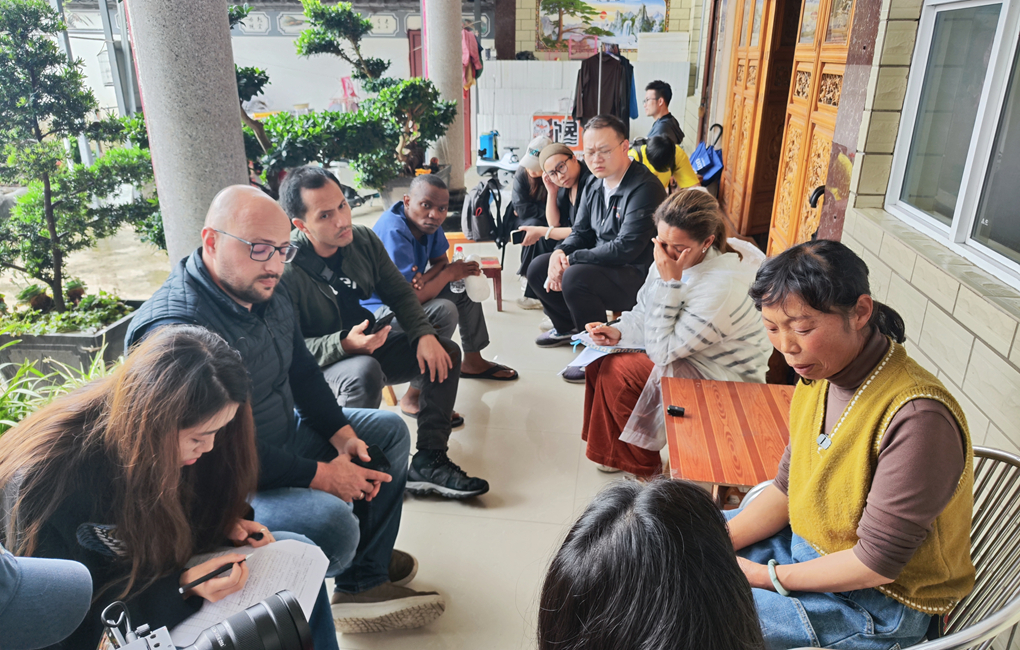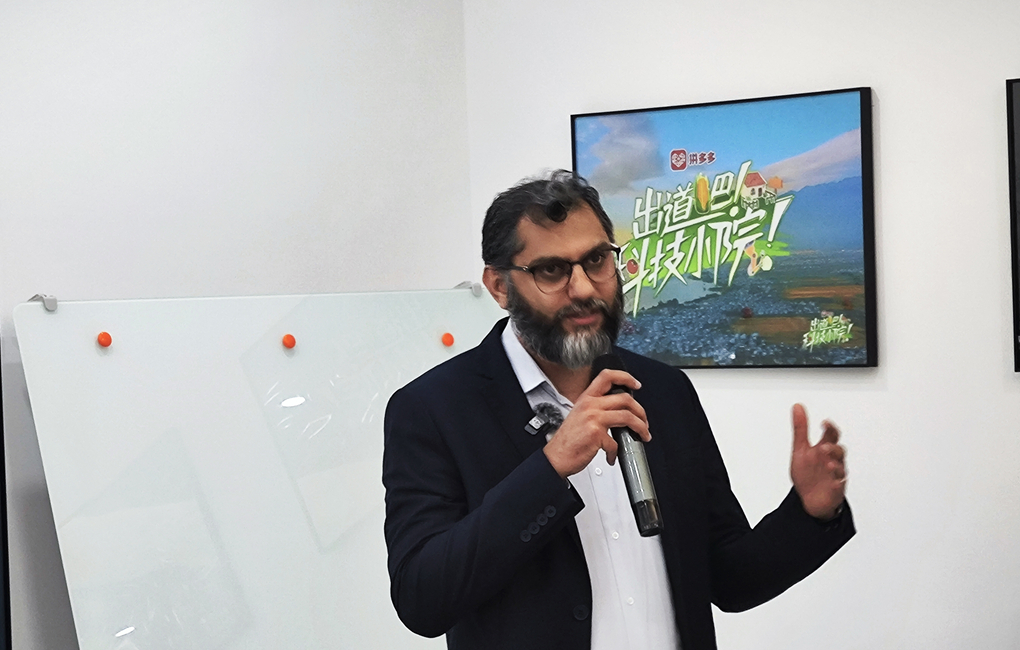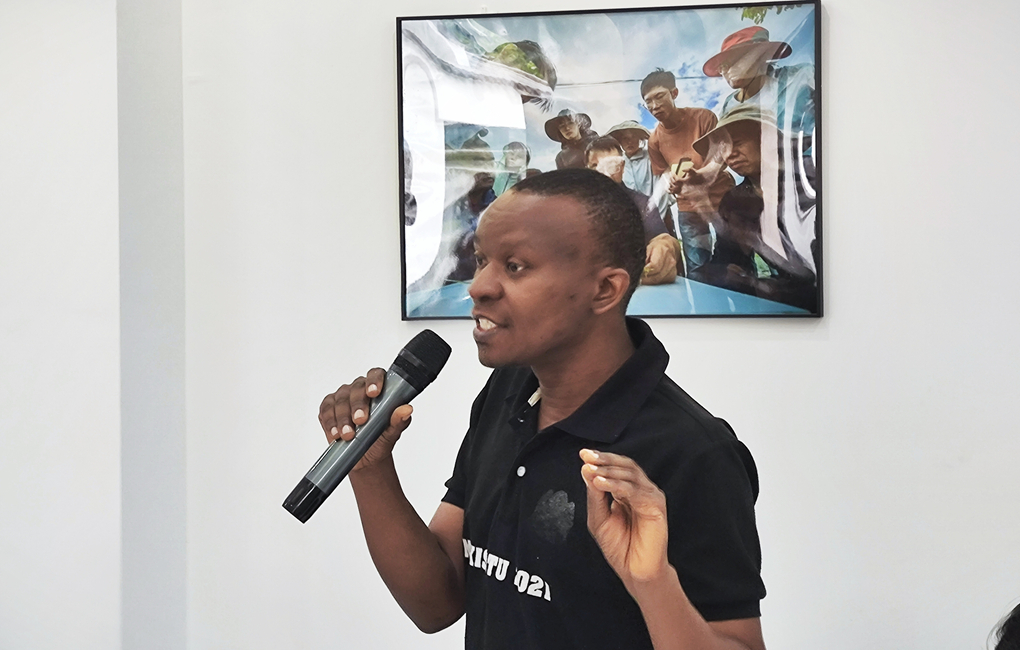
This photo shows young agri-innovators conducting a field visit at a local farmer's home in Dali, southwest China's Yunnan Province, May 28, 2025. (Xinhuanet/Liu He)
By Liu He
Few would expect that simply adapting a system's voice recognition to local languages and accents could triple its usage. But that's exactly what has happened with a voice biometrics service for farmers in Peru.
Many farmers there don't use Spanish in daily life; instead, they speak Quechua, an indigenous language in South America. "When we switched the system to the farmers' local language," said project founder Robinson Lopez Monzon, "they felt someone understood them and was close to them."
He shared this experience at the Digital Agriculture Innovation Bootcamp 2025 in Dali, southwest China's Yunnan Province. The event brought together young agricultural innovators from across the world to explore tech solutions rooted in real human needs.

Robinson Lopez Monzon shares his insights at a discussion session during the Digital Agriculture Innovation Bootcamp 2025 in Dali, southwest China's Yunnan Province, May 28, 2025. (Xinhuanet/Liu He)
Khalil Rashid, an agri-innovator from Germany, shared similar insights. He emphasized that overcoming the issue of user acceptance among farmers hinges on a fundamental shift: instead of merely presenting technology, innovators must demonstrate its tangible benefits in their daily lives.

Khalil Rashid shares his insights at a discussion session during the Digital Agriculture Innovation Bootcamp 2025 in Dali, southwest China's Yunnan Province, May 28, 2025. (Xinhuanet/Liu He)
Khalil's project, RemoteWell, is an IoT-based smart well management system. He explained that farmers, who are proud of their traditional ways, often dismiss direct proposals for new technology.
Instead of boasting about technologies, Khalil emphasized that innovators must communicate with the farmers, understand their demands and focus on how the solutions can simplify their lives and enhance productivity.
The young agri-innovators, all of whom gained entry or received support through the preceding Global AgriInno Challenge, found inspiration and pathways for future development at platforms such as the Digital Agriculture Innovation Bootcamp 2025, a key follow-up initiative of the Challenge.
The inspiration found through their experience and exchange in China is already translating into tangible growth for some. Edmond Ng'walago, CEO and founder of Climate Smart Irrigator in Tanzania, exemplifies his gain through an interview with Xinhuanet.

Edmond Ng'walago shares his insights at a discussion session during the Digital Agriculture Innovation Bootcamp 2025 in Dali, southwest China's Yunnan Province, May 28, 2025. (Xinhuanet/Liu He)
By the time we entered the Challenge, we were serving over 3,000 smallholder farmers. Today, with the skills and support we've gained through this initiative, our reach has expanded to over 5,000 farmers, Edmond said.
The user-centric innovation in agriculture resonates with international experts including Fruit Hailu Tessema, a Digital Agriculture Innovation Expert with the Food and Agriculture Organization (FAO) of the United Nations.
All the solutions that we propose from academia, from research institutions, and from the private sector must be user-centric, based on the needs, the voice, and the demands of the farmers, Tessema said.
Tessema also highlighted the significance of mutual exchanges through international platforms like the Bootcamp in digital agriculture. These platforms are crucial for agri-innovators from developing countries, allowing them to build on existing technologies and innovations, as well as those in China, rather than starting from scratch, she said.
The lesson China has cultivated here in Dali, focusing on connecting the needs of smallholder farmers with advancements in digitalization and technology, is truly a benchmark for other countries, Tessema noted.
The Digital Agriculture Innovation Bootcamp 2025 is a joint initiative by the FAO, Zhejiang University, and Pinduoduo. This global platform brought together 16 young agri-innovators from eight countries, focusing on leveraging emerging technologies and digital public infrastructure to promote sustainable agri-food systems.
编辑:呼乐乐